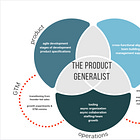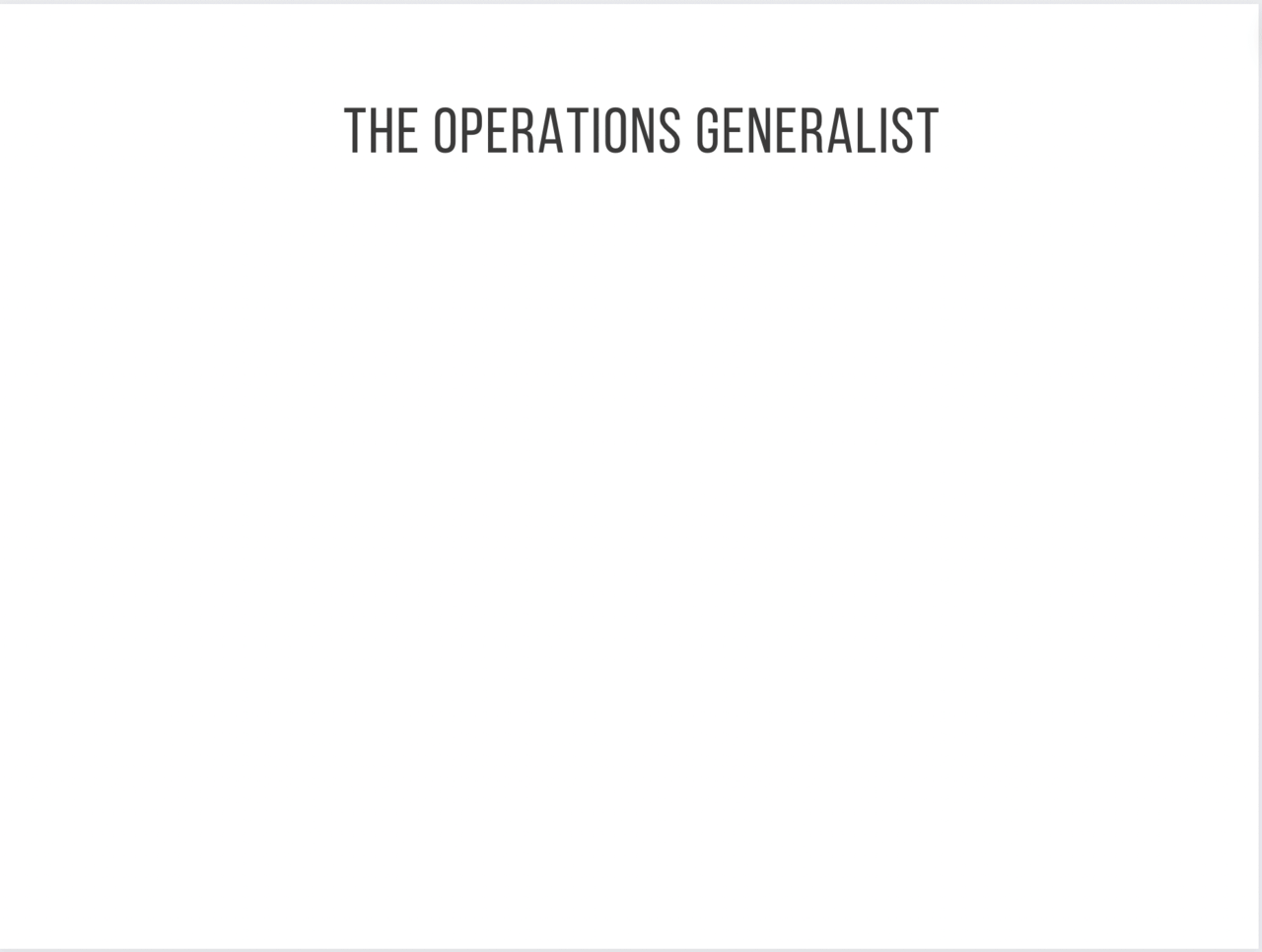What’s the difference between an operations specialist and an operations generalist?
The second in a new hWD series on generalist vs. specialist hires. This week? Operations
Part II
With an etymology meaning "to work, labor, or exert", operations has evolved from the military - where work requires diligent coordination and planned action to execute missions safely - and the industrial revolution - when the focus shifted to optimizing processes and systems for better productivity. Fast forward to the days of computing and the rise of the knowledge economy, operations now also encompass how we work on work and the connective tissue that propels our companies forward.
Operations is one role that immediately connotes broad responsibility and generalist skills. Answering a question with “I work in operations” may prompt further questions from the person who asked as they realize they still have no real clue what you do. Despite it being a role capable of making an impact on every aspect of a business, it can be one of the hardest to define. As an early-stage founder building out a team, “operations” may feel like a luxury, not a necessity, a cost center as opposed to a revenue driver.
Reframing operations in the early days
What makes operations unique in the nascent days of an org is twofold; first, for small teams who are green in defining how they do what they do, thoughtful design of the internal operations of your business can be a revenue driver and have an outsized impact establishing a rhythm of business, optimizing your processes, and increasing your chances to achieve your goals. Second, while operations isn’t really a function at this stage, it does act as the throughline to everything your team does, impacting whether or not the team will achieve product-market fit, weather the startup storms and achieve scale. Taking a generalist approach to your operations will strengthen not only each individual function but the organization as a whole.
The Operations Specialist
An operations specialist, often titled Director of Operations or Operations Manager, may have a more defined role that is dependent on the existing operating structures of the business within a certain function or domain. This professional often has deep expertise in the domain or type of business they're operating within so that when they jump in, they already have a sense of industry best practices and can identify what’s looking right and looking way wrong.
Further, the structure of the business is an operating specialist’s core responsibility, ensuring that core business processes are executed correctly. Ops specialists may support various other functions as it relates to the ops side of HR or finance or marketing for example, but don’t necessarily have direct functional oversight. They own operations deeply, not widely.
The Operations Generalist
The magic of the operations generalist is rooted in an inch-deep/mile-wide philosophy that allows them to flex into more nuanced areas such as people ops, sales ops, marketing ops, finance, and customer support while also taking on project management and various special projects to extend the founder’s reach. Sometimes titled Chief of Staff, COO, or simply operations generalist, these team members can also get granular within how a function works to better support the team while ensuring alignment and enablement. This creates more space for “first in seat” type work, meaning such an operator can completely build out or restructure a fledgling function with enough thoughtful design thinking and diligent execution to bridge the gap to having a full-time or specialized counterpart fill the role.
The operations generalist is also likely the primary person next to the founder who is working on work; meaning that while they’ll sometimes have a focus on how to make the entire org more efficient, a nod to the military and centuries-old function, they’ll also be a startup’s culture keeper, tying the company’s why and what to it’s how. They’ll be your people people without being traditional people operators (more on that in a few weeks).
who You Need
Unless the founding team is lacking in domain knowledge and expertise, which is rare for a successful early-stage startup, it’s unlikely that early teams need a true operations specialist. An operations generalist can be broad enough to be a founder force-multiplier, covering both the first in-seat systems building and the “space-between” - the uncharted areas between functions that ultimately need a thoughtful generalist approach (i.e. revenue operations, customer experience, business operations, etc).
TLDR
You can assess the need for your early org in how each profile approaches their work, measures impact, and solves problems.
Approaching Work
The Specialist: A specialist operator approaches work a bit more focused and defined in scope. “While there is space for flexibility and ad hoc projects, for the most part, the role is focused on ensuring systems are running smoothly. It's more defined and repetitive and works in line with established OKRs and KPIs,” says Scott Eichner, lead oAT operations generalist. “It’s still vital to have a cross-functional understanding, but a specialized operator will be more oriented around ongoing operations.”
The Generalist: An operations generalist is tasked with ensuring systems are running smoothly on a global level. Ops generalists become the point person to solve problems beyond the traditional scope of a singular function. To that end, embedded in the approach is building a reputation of understanding generally what is happening across the org so that, while not an expert, the team has confidence in this operator's ability to build quick context and understand the interconnectedness of systems so that they can contribute or fill a gap, as needed. Lead operations generalist Kelsey Conroy shares, “An operations generalist approaches operations from a holistic view, tackling blockers to operational excellence regardless of whether or not they are directly related to operations. This may include designing and implementing a new way to integrate the work of multiple teams in the organization.”
Measuring Impact
The Specialist: Operations specialists contribute to KPIs and OKRs that are tied to general company-wide growth, while the success metrics they own are solely within the operations domain of the business. An example could be how well this team member improves the efficiency of an operations process by X%, usually in a reduction of time spent or money saved.
The Generalist: It can often feel tricky to quantify the impact of a generalist through a number, but rather the impact is often in the way that founders feel about their work and the overall ease of work, reduction of complexity, amount that’s been shipped or the amount that the team learns. Often operations generalists are in a block-and-tackle position, reducing friction for issues that could pose future problems. When needing to quantifiably assess a generalist’s impact, look to metrics that impact the broader business model, for example, the efficiency of a specific process improved by X%.
Solving Problems:
The Specialist: Operations Specialists - like generalists - take a problem-solving approach rooted in understanding, oftentimes working in conjunction with other folks across the org, to get from point A to B. Instead of taking a systemic and people-centric approach, they may focus on improving standards and processes for the business within the existing structure. For example, an operations specialist may work on better tracking of invoices that are created and sent to clients by another team in a separate platform.
The Generalist: By leaning on cross-functional knowledge and communication and a willingness to go the extra mile to investigate a problem, operations generalists keep tabs on what is happening across the org in search of broad-based, cross-functional solutions. Strong generalists are expert problem solvers rooted in curiosity, persistence, and initiative. They dare to challenge and re-imagine processes outside of a specific scope to impact operations and other domains across the company. For example, they may create a system that allows for the creation, storage, and sharing of invoices across teams in a single source of truth.
Before you go
While both ops specialists and ops generalists can play integral roles in organizational success, they diverge significantly in their approach and scope. The specialist, honed in on a specific domain or function, meticulously ensures the smooth execution of established processes, whereas the generalist adopts a broader perspective, tackling issues across various functions with a holistic view. While specialists delve deep to optimize within their realm, generalists serve as versatile problem solvers, bridging gaps between functions and driving operational excellence on a wider scale. Understanding these distinctions is key to assembling a cohesive and effective operations team tailored to your early-stage organization's needs.
Writer: Britt





